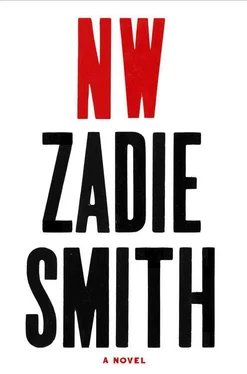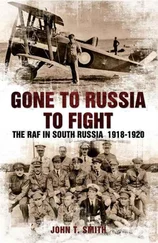— Michel! Stop it! It’s not him. Please — this is my husband, he’s confused, please don’t hurt him, please leave us alone, please.
The foot, indifferent, draws further back, for greater range. Leah begins to cry. In the corner of her eye she observes a young white couple in suits crossing the road to avoid them. No one will help. She puts her hands together in prayer.
— Please leave him alone, please. I’m pregnant — please leave us alone.
The foot retreats. A hand looms over Michel as he struggles to his feet, a hand in the shape of a gun, pointed at his head.
— Step to me again— brrp brrp! — you’ll be gone.
— Fuck you. OK? I’m not scared of you!
In a blink the foot is drawn back once more and released into Olive’s belly. She is propelled several yards into the doorway of the sweetshop. She makes a noise Leah has never heard before.
— Olive!
— You’re lucky your gal came for you bruv. Otherwise.
He is already half way across the road, shouting over his shoulder.
— Otherwise what? You fucking coward! You kick my dog! I’ll call the police!
— MICHEL. Don’t make it worse.
She has a hand to his chest. To any bystander it would appear that she is holding him back. Only she knows that he is not really trying to push her away. In this way the two men part, abusing each other roundly as they go, playing with the idea that they are not finished, that any moment they might turn back and set upon each other. It is only more make-believe: the presence of a woman has released them from their obligation.
Leah believes in objectivity. She is a little calmer now, they are almost home. Who was that woman at the moment of crisis, screaming and weeping, begging on her knees in the street? Silly to admit it, but she had thought of herself as “brave.” A fighter. Now she is introduced to a deal-maker, a pleader, a tactical liar. Please don’t destroy the thing I love! And her petition had been heard, and a lesser sacrifice made in its place, and in the moment she was simply, pathetically grateful for the concession.
Afterward, too, she could not instantly put herself back together. It is Michel who holds Olive in his arms, and thumps upon their own front door while Leah goes on not being able to discover which shopping bag contains the key.
— Is she OK?
— She’s fine. Unless she’s hurt inside. To me she looks fine. Shocked.
— Are you OK?
The answer is in his face. Humiliation. Fury. Of course, it’s harder for a man to be objective. They have the problem of pride.
— Ned!
— Guys, you OK?
— Help Lee with those bags.
They go into the kitchen and lay the beloved dog in its bed. She looks OK. Feed her? She eats. Throw a ball? She runs. Maybe she’s OK, but for the humans there is still too much adrenaline and trauma to move on. Leah tells Ned the story, purging it of any possible fury or humiliation. Michel the brave! Michel the defender! She puts a hand on her husband’s arm. He shrugs it off.
— She pretended she was pregnant. He took pity on us! I was lying on the floor like an idiot.
— No. You stopped it getting any worse than it needed to be.
She puts a hand on his arm again. This time he lets her.
— Do you think we should leave her tonight? I don’t know. Ned, could you keep an eye out? Call if there’s any problem? Or maybe we should just stay in. Cancel.
It’s dinner, says Michel, I don’t think we can cancel. She’s OK. You’re OK, baby, aren’t you? You’re OK? The two humans look into the animal’s eyes for reassurance. Leah struggles to be objective. Wouldn’t one of the humans have said the word “vet” by now if they did not fear how much money saying “vet” would entail?
Hanwell never gave dinner parties. Nor did he go out for dinner. That’s not true: on special occasions he took his little family to Vijay’s on Willesden Lane where they took a table near the door, ate quickly, and grew self-conscious of their conversation. Nothing in Leah’s childhood prepared her for the frequency with which she now attends dinner parties, most often at Natalie’s house, where she and Michel are invited to provide something like local color. Neither of them know what to say to barristers and bankers, to the occasional judge. Natalie cannot believe that they are shy. Each time she blames some error of placement but each time the awkwardness remains. They are shy, whether Natalie believes it or not. They have no gift for anecdote. They look down at their plates and cut their food with great care, letting Natalie tell their stories for them, nodding to confirm points of fact, names, times, places. Offered to the table for general dissection these anecdotes take on their own life, separate, impressive.
— or just ran. I would have run like the bloody wind and left them to it. No offense, Michel. You’re very brave.
— And then did you just both go your separate ways? “Thank you, I’ve been your potential murderer today, now I must be off…”
— Ha!
–“Got a rather full day of muggings to attend to with my pretend gun.”
— Ha!
— Can you pass that salsa thing? Do you think if you make a gun sign with your fingers that means you actually have a gun or that’s like basically your only gun? Recession bites everyone, I suppose… why should gangsters be immune? Look, I’ve got one, too. Brrrp!
— Ha! Ha!
— Wait, but, sorry — you’re pregnant?
Twelve people at Nat’s long oak dining table stop talking and laughing and look at Leah caught wrestling the breast of a duck.
— No.
— No, it was just something she said, you know, to stop him.
— Very brave. Quick thinking.
Natalie’s version of Leah and Michel’s anecdote is over. The conversational baton passes to others, who tell their anecdotes with more panache, linking them to matters of the wider culture, debates in the newspapers. Leah tries to explain what she does for a living to someone who doesn’t care. The spinach is farm to table. Everyone comes together for a moment to complain about the evils of technology, what a disaster, especially for teenagers, yet most people have their phones laid next to their dinner plates. Pass the buttered carrots. Meanwhile parents have become old and ill at the very moment their children want to have their own babies. Many of the parents are immigrants — from Jamaica, from Ireland, from India, from China — and they can’t understand why they have not yet been invited to live with their children, as is the custom, in their countries. Technology is offered as a substitute for that impossible request. Stair lifts. Pacemakers. Hip replacements. Dialysis machines. But nothing satisfies them. They worked hard so we children might live like this. They “literally” will not be happy until they’ve moved into our houses. They can never move into our houses. Pass the heirloom tomato salad. The thing about Islam. Let me tell you about Islam. The thing about the trouble with Islam. Everyone is suddenly an expert on Islam. But what do you think, Samhita, yeah what do you think, Samhita, what’s your take on this? Samhita, the copyright lawyer. Pass the tuna. Solutions are passed across the table, strategies. Private wards. Private cinemas. Christmas abroad. A restaurant with only five tables in it. Security systems. Fences. The carriage of a 4x4 that lets you sit alone above traffic. There is a perfect isolation out there somewhere, you can get it, although it doesn’t come cheap. But Leah, someone is saying, but Leah, in the end, at the end of the day, don’t you just want to give your individual child the very best opportunities you can give them individually? Pass the green beans with shaved almonds. Define best. Pass the lemon tart. Whatever brings a child the greatest possibility of success. Pass the berries. Define success. Pass the crème fraîche. You think that the difference between you and me is that you want to give your child the best opportunities? Pass the dessert spoon. It’s the job of the hostess to smooth things over, to point out that these arguments are still hypothetical. Why argue over the unborn? All I know is I don’t want to push something the size of a watermelon out of something the size of a lemon. Nurse: bring on the drugs! Have you thought about doing it in water? Everyone says the same things in the same way. Conversations tinged with terror. Captive animals, contemplating a return to nature. Natalie is calm, having already traveled to the other side. Pass the laptop. You’ve got to see this, it’s only two minutes long, it’s hilarious.
Читать дальше











